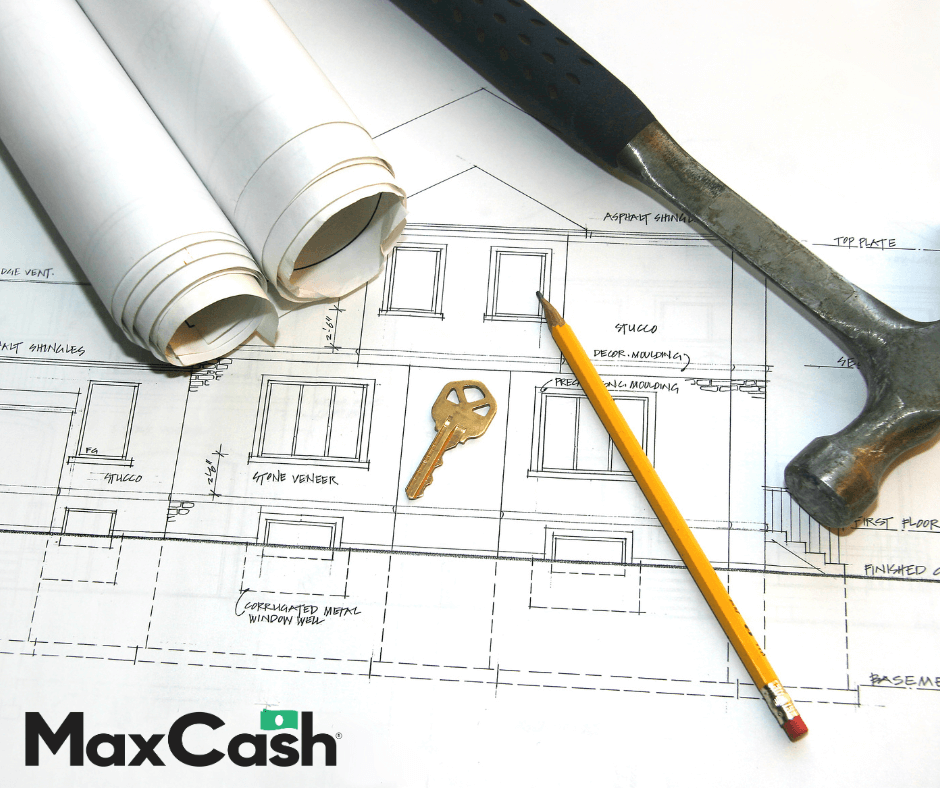A loan for home improvements is specifically designed to fund repairs or projects that improve the value of your home. Your home could be repaired, your kitchen or bathroom renovated, or you might just want to overhaul the whole place to modernize it. Whatever your goal is, a home improvement loan is designed to help you.
Whether you want a new kitchen, more living space, or if you’re in dire need of repairs, a loan for home improvements can turn your home into your dream home. Before you dive in, know that traditional bank loans or HELOC (Home Equity Line of Credit) can cover the costs of most projects. But, they might be more difficult to obtain if you have a poor credit score.
To get money for those much-needed home repairs or projects, consider taking out a car title loan. Max CashⓇ Title Loans works to make the process as simple as possible for you. Then, you can focus on what matters most- improving your home.2 5
What Credit Score Do You Need For a Home Improvement Loan?
The credit requirements for a loan or a line of credit typically depend on the financial institution you are applying with. But they can be influenced by other factors, such as:
- Your Credit History
- Your Income
- Your Debt-to-Income Ratio
Generally, the higher your credit score, the better your credit rating. A better credit rating indicates more creditworthiness. That means you are more likely to receive loan approval and favorable loan terms.4 5
Types of Home Improvement and Repair Loans
There is no one-size-fits-all option for obtaining a home repair or home improvement loan. Whether you need a large or small loan to pay for projects, have sufficient equity in your home, or do not have a strong credit history, you need to factor these items into your decision to get a loan. Some of your available loan options include the following:
- Personal Loans: Approval for this type of unsecured loan depends mainly on your credit score and income. They are commonly marketed for home improvement projects because of their flexibility and quick access to funds. However, since collateral is not included in the application process, you may have difficulty obtaining approval if you do not have a strong credit history.
- Home Equity Loans: These are secured loans that allow you to borrow against the available equity in your home by using the asset as collateral. Home equity loans typically have higher borrowing limits, making them suitable for larger renovations and projects.
Other Borrowing Options
- Home Equity Lines of Credit (HELOCs): Similar to home equity loans, a HELOC will essentially operate like a credit card. As a borrower, you will have a credit limit that you can borrow against, repay, and borrow again, making them ideal for ongoing projects that have undetermined costs. However, HELOCs are only a viable option if you have accumulated enough equity in your home to borrow against. Equity is the difference between a home’s fair market value and how much an individual currently owes on a mortgage. For homeowners lacking equity in their house, or who would rather not borrow against the property, HELOCs may not be the way to go.
- Cash-Out Refinance: This involves refinancing your mortgage for more than what you owe and receiving the difference in cash.
- Online Title Loans: When it comes to loans for home repairs, Max Cash Title Loans has the answer. If you are eligible for an online title loan and meet the requirements, you can use your funds to purchase supplies, pay contractors, and get your project completed.5
Are Renovation Loans a Good Idea?

The short answer is that it depends. Specific home improvements can boost your home’s market value, which translates to a higher sale price when you’re ready to put it on the market.
A loan for home improvement can finance certain projects that positively change the way you live. This may include updating to energy-efficient equipment or expanding your living area to make it more comfortable. Depending on the type of repairs that you decide to invest in, you could see your investment turn a profit in the future!
Frequently Asked Questions About a Loan for Home Improvements
Do Renovation Loans Have a Higher Interest Rate?
Rates tend to vary depending on the type of loan, your credit history, and the market rate, in some cases. Secured loans frequently provide lower rates due to the use of collateral. They may be a viable option if you do not have a strong credit score.4 In the case of installment loans, longer loan periods result in lower monthly payments but can increase the amount of interest you pay over the life of the loan. Make sure to shop around and determine how the terms of your loan or line of credit line up with your financial plans.4
What Type of Home Repair Loan is Right for Me?
Your project’s scope and size, along with your financial background, can help you determine which loan is an ideal fit for you. If you only need a small amount of money for a short-term project and have ideal credit, a personal loan may make the most sense. However, if you aren’t sure how much you will need to borrow and have equity built up in your home, then a HELOC can be the answer. If your score is not up to par and you have a paid-off car in your name, then your other option is a title loan.5
Will a Home Improvement Loan Affect My Credit?
If you do not pay your loan back, your lender or loan servicer reports this behavior to one of the major credit bureaus. At this time, your score will be adversely affected.
Get a Loan to Deal With Unexpected Repairs
That dream home mentioned above can quickly turn into a nightmare when it comes to unexpected repairs. This is especially true for first-time homeowners. A survey by CNBC reveals that around 77% of new homeowners faced repair obstacles within their first year. These issues range from old roofs leaking and outdated electrical wiring malfunctioning to tree limbs breaking through windows.

Homeowners deal with many issues when an unexpected home repair arises, including financial pressure and emotional strain. Unanticipated repairs often come with huge expenses, and most homeowners do not have emergency funds set aside to handle them. A loan can come in handy during these tough times.
The cost of the materials required and labor rates in your area play a major role in the total cost of a home repair, as well as whether the repair is needed immediately. Here are some common costs associated with getting your home back into shape:
- Roof Repairs and Replacements: Minor fixes may set you back a few hundred or thousand dollars. But, a full roof replacement could range anywhere from $6,700 to over $80,000.
- HVAC System Repairs: Repairing an HVAC system for minor issues can cost between $150 and $450. However, replacing the system could cost between $4,000 and $12,000 based on its size and desired efficiency level.
- Plumbing: Clearing clogged drains can cost as little as $100, but replacing a sewer line can cost well over $3,000.
- Electrical Work: An electrical outlet can cost less than $200 to replace. However, rewiring an entire house can cost from $2,000 to $6,000 or more, depending on the size of the home.
Max Cash Car Title Loan For Home Improvements
Homeowners looking for an alternative to traditional home improvement financing, like HELOCs, can turn to car title loans. These loans are secured against your car title, making them accessible to a larger number of homeowners who may not have enough equity in their homes to borrow against.
Title loans offer an easy way to get funds for home improvements. They work well with smaller or medium-sized projects, or even emergency repairs that require immediate funding. You can easily fill out a simple online form if you’re in a rush to fix your house! To get started over the phone, simply call 855-561-5626 to talk with a Max Cash title loan agent.5
Unfortunately, if you don’t have a “rainy day” account for sudden repairs, you might feel a little overwhelmed. A title loan may be a great option for both big and small fixes. Max Cash Title Loans can help you find a lender with competitive interest rates while also providing you with amazing service 7 days a week.4 5 Don’t let your house fall apart just because you lack the funds to get it fixed! You can inquire about a title loan right now, even if your credit is less than perfect.5

